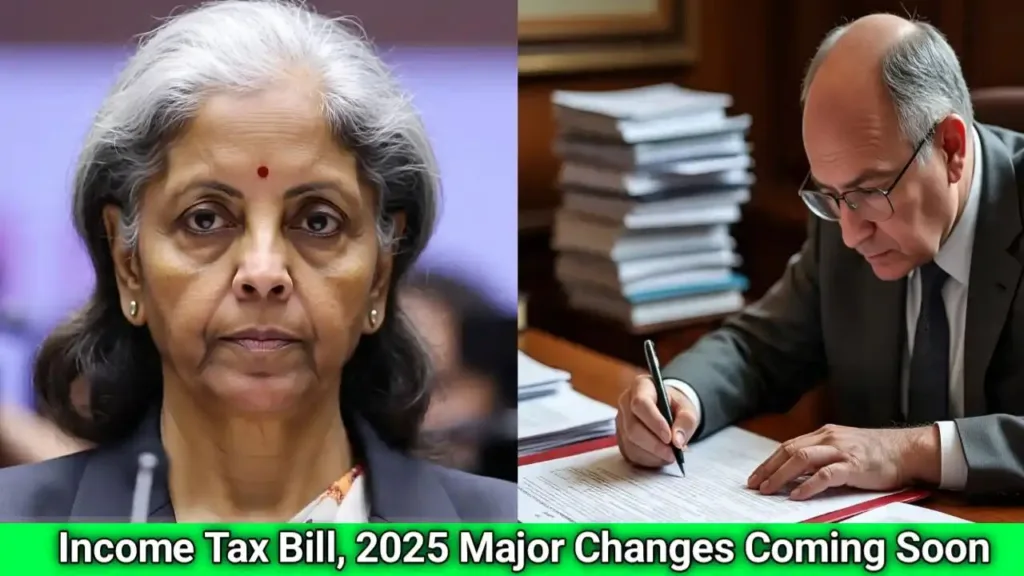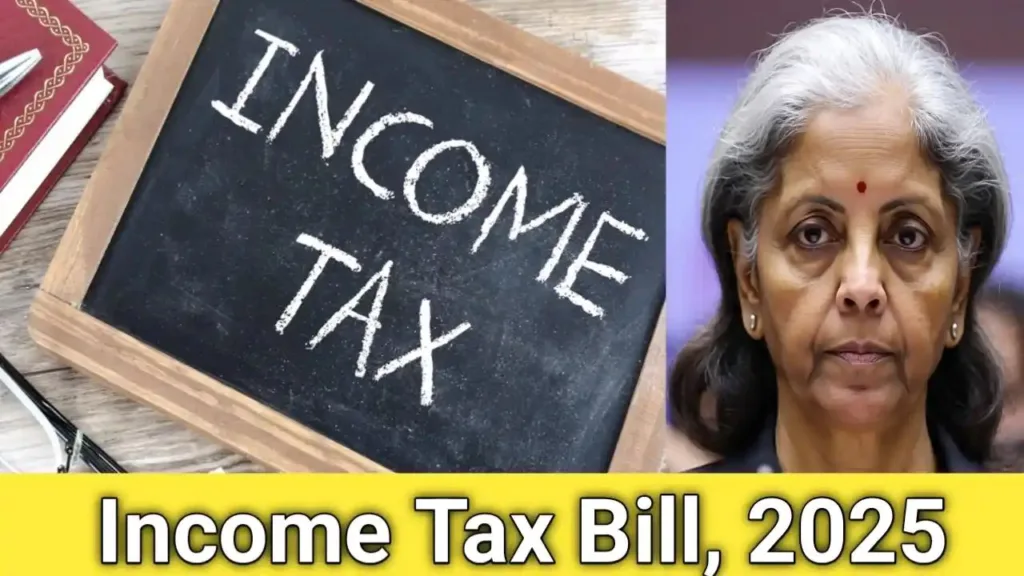
New Delhi, August 8, 2025 – In a significant move, the central government has formally withdrawn the Income Tax Bill, 2025 from the Lok Sabha, setting the stage for a completely revised version to be introduced next week. The bill, which was tabled in the lower house on February 13, 2025, was designed to replace the Income Tax Act, 1961 – a law that has governed India’s direct taxation system for over 60 years.
This withdrawal is not a rollback of reforms but rather a strategic step to ensure that the updated bill includes all recommendations from the Select Committee of the Lok Sabha, chaired by BJP MP Baijayant “Jay” Panda.
According to senior government officials, the revised Income Tax Bill is expected to be introduced in Parliament on Monday, with a clear focus on simplifying tax laws, reducing litigation, and easing compliance for individuals and businesses.
Why the Income Tax Bill, 2025 Was Withdrawn
The original bill aimed to modernize India’s tax system but required substantial fine-tuning. After its introduction in February, the bill was sent to a Parliamentary Select Committee for review. This committee examined stakeholder inputs, expert advice, and public feedback before making detailed recommendations.
The government decided to withdraw the original draft to avoid confusion between multiple versions and instead bring in a single, updated bill that incorporates most of the committee’s suggestions.
A senior Finance Ministry official explained:
“We wanted to ensure that MPs and the public are considering only one definitive version of the bill, with all agreed changes already in place. This will make parliamentary debate smoother and prevent unnecessary delays.”
Baijayant Panda on the New Bill
BJP MP Baijayant Panda, who chaired the Select Committee, said the new draft is a once-in-a-generation reform for India’s direct tax system.
“The current Income Tax Act of 1961 has undergone over 4,000 amendments and now runs over 5 lakh words. It is too complex for most taxpayers to read and understand. The new bill will simplify the law by nearly 50%, making it more concise, clearer, and easier to navigate,” Panda told news agency IANS.
Panda emphasized that small business owners, MSMEs, and ordinary citizens will be the biggest beneficiaries of this change.
“Small business owners often do not have the legal or financial resources to interpret a complex tax code. This new structure will reduce their compliance burden and help avoid costly litigation,” he added.

The Problems with the Current Tax Law
The Income Tax Act, 1961 was originally drafted to meet the needs of a very different economy. Over the decades, India’s business environment, global trade rules, and digital economy have evolved dramatically.
However, instead of rewriting the law, successive governments kept adding amendments – more than 4,000 in total. This led to:
- Excessive complexity – legal provisions are difficult to interpret for the average taxpayer.
- Inconsistent clauses – multiple amendments sometimes contradict each other.
- Higher litigation – unclear laws lead to more disputes between taxpayers and the government.
- Compliance challenges – individuals and MSMEs struggle to keep up with constant changes.
How the New Income Tax Bill Will Simplify the System
The revised bill is expected to address these issues by:
- Cutting the length of the law by nearly half.
- Using simpler language so non-experts can understand tax obligations.
- Consolidating rules to avoid conflicting provisions.
- Creating a clearer dispute resolution mechanism to reduce litigation.
Key Benefits for Taxpayers
According to government sources, the new bill is designed with the ordinary taxpayer in mind. The focus will be on fairness, transparency, and ease of filing.
Some major benefits include:
- Lower Taxes for Middle Class
- The new tax slabs will substantially reduce the tax burden for middle-income earners, leaving them with more disposable income.
- Higher Rebate Limit
- Under Section 87A, the income threshold for claiming a rebate under the new tax regime (Section 115 BAC) will be increased from ₹7 lakh to ₹12 lakh.
- The maximum rebate amount will rise from ₹25,000 to ₹60,000.
- Marginal Relief Maintained
- Marginal relief will still apply to incomes slightly above ₹12 lakh to prevent sharp jumps in tax liability.
- Boost to Consumption & Savings
- By leaving more money in people’s hands, the new structure is expected to increase household spending, savings, and investments.
- Simplified Filing for MSMEs
- Small businesses will have fewer compliance steps, simpler forms, and reduced paperwork.
Government’s Vision Behind the Reform
Finance Ministry officials have made it clear that the aim is not just tax rate changes, but a complete overhaul of how income tax is understood, applied, and enforced in India.
The government’s vision includes:
- Making the tax code accessible to all citizens.
- Reducing arbitrary interpretations of tax laws by minimizing grey areas.
- Ensuring predictability in tax policy so that businesses can plan better.
- Protecting middle-class interests while broadening the tax base.
Timeline of the Income Tax Bill, 2025
- February 13, 2025 – Bill introduced in Lok Sabha.
- March 2025 – Referred to Select Committee chaired by Baijayant Panda.
- July 2025 – Committee submits its report with major recommendations.
- August 8, 2025 – Government withdraws original bill to avoid confusion.
- August 11, 2025 – Revised bill to be introduced in Parliament.
Expected Impact of the New Bill
Experts believe the reformed tax code could:
- Increase compliance rates as filing becomes easier.
- Reduce tax disputes, saving both citizens and the government legal costs.
- Boost investor confidence, as a simpler law is easier to follow.
- Encourage entrepreneurship, as MSMEs will face fewer procedural hurdles.
Economist Dr. Anita Mehra notes:
“Tax simplification is as important as tax reduction. Even if rates are low, a complex system discourages participation. This bill could mark a turning point for India’s ease of doing business.”
Public Reaction
Early responses from taxpayers and business associations have been positive. Many see this as a long-overdue move to unclutter the tax system.
Ramesh Gupta, a Delhi-based garment exporter, said:
“Every budget season, we used to hire experts just to understand the changes. If the new law is truly simpler, it will save us time and money.”
What Happens Next
The revised bill will be presented in the Lok Sabha on Monday. Once tabled, it will go through the usual debate, discussion, and voting process. If passed, it will replace the Income Tax Act, 1961, bringing India’s tax laws into a new era.
Conclusion
The withdrawal of the Income Tax Bill, 2025 is not a setback but a strategic reset. By consolidating all changes into a single, simplified version, the government is aiming to deliver one of the most significant tax reforms in independent India’s history.
If implemented effectively, the new bill could reduce compliance burdens, empower the middle class, boost MSMEs, and make India’s tax system fairer and more transparent than ever before.
FAQs – Income Tax Bill, 2025
Q1. Why was the Income Tax Bill, 2025 withdrawn?
The government withdrew the bill to avoid confusion between multiple versions and to present a single, updated draft that includes recommendations from the Select Committee.
Q2. Who headed the Select Committee for the bill?
The committee was chaired by BJP MP Baijayant “Jay” Panda.
Q3. What is the main goal of the new Income Tax Bill?
The new bill aims to simplify the tax code by nearly 50%, reduce litigation, make compliance easier, and ensure no additional burden on the middle class.
Q4. What are the major changes in the new bill?
Key changes include raising the Section 87A rebate limit to ₹12 lakh, increasing the maximum rebate to ₹60,000, updating tax slabs, and retaining marginal relief.
Q5. How will MSMEs benefit from the new tax law?
MSMEs will face fewer compliance requirements, simpler rules, and reduced legal disputes, saving them both time and resources.
Q6. When will the new bill be introduced?
The revised bill will be tabled in the Lok Sabha on Monday, August 11, 2025.
Q7. Will the new bill reduce taxes for the middle class?
Yes. The updated tax slabs and increased rebate limit are expected to substantially reduce taxes for middle-income earners.
Read More:-Behavioral Finance & Psychology: The Hidden Forces Shaping Your Investment Decisions